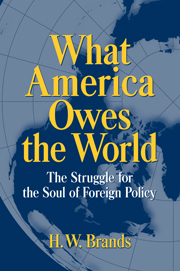Book contents
- Frontmatter
- Contents
- Preface
- 1 Exceptionalists All! The First Hundred Years
- 2 Brooks Adams: Marx for Imperialists
- 3 Walter Lippmann and a New Republic for a New Era
- 4 When the Future Worked and the Trains Ran on Time: Lincoln Steffens
- 5 Dr. Beard's Garden
- 6 Kennan, Morgenthau, and the Sources of Superpower Conduct
- 7 Reinhold Niebuhr and the Foreign Policy of Original Sin
- 8 God Blinked but Herman Didn't
- 9 On Wisconsin: Madison and Points Left
- 10 The Brief of Norman's Woe: Commentary and the New Conservatism
- 11 It Ain't Over till It's Over – and Not Even Then
- Note on Sources
- Index
11 - It Ain't Over till It's Over – and Not Even Then
Published online by Cambridge University Press: 25 March 2010
- Frontmatter
- Contents
- Preface
- 1 Exceptionalists All! The First Hundred Years
- 2 Brooks Adams: Marx for Imperialists
- 3 Walter Lippmann and a New Republic for a New Era
- 4 When the Future Worked and the Trains Ran on Time: Lincoln Steffens
- 5 Dr. Beard's Garden
- 6 Kennan, Morgenthau, and the Sources of Superpower Conduct
- 7 Reinhold Niebuhr and the Foreign Policy of Original Sin
- 8 God Blinked but Herman Didn't
- 9 On Wisconsin: Madison and Points Left
- 10 The Brief of Norman's Woe: Commentary and the New Conservatism
- 11 It Ain't Over till It's Over – and Not Even Then
- Note on Sources
- Index
Summary
Ronald Reagan didn't make neoconservatism; the converse was more nearly correct. Yet Reagan gave the constellation of ideas the neoconservatives promoted a genial gloss their hard hearts never could have provided. (He also gave lots of neoconservatives, from Jeane Kirkpatrick down, positions in government.) The wonder of Reagan was his ability to cause Americans to feel warm and fuzzy about a presidency devoted to a crabbed and dismal view of human nature – to a conviction that individuals responded to no higher sentiment than self-interest and that the world would never know peace short of the annihilation of dissent from America's official anticommunist ideology. It was significant that polls regularly showed far higher support for Reagan personally than for his policies.
Mikhail Gorbachev didn't unmake neoconservatism; the converse was more nearly correct – or at least it would have been if some of the neoconservatives had had their way. The neoconservatives recognized that the urgency of their message depended on a condition of confrontation between the United States and the Soviet Union. Gorbachev, by directing a restructuring of Soviet society away from the Stalinist model and allowing the introduction of pluralism elsewhere in the East bloc, threatened to deprive the neoconservatives of their present-dangerist raison d'tre. Alarmed by the prospect of their wishes coming true, many of the neoconservatives balked at the brink of success.
But after a couple of years of declaring Gorbachev merely a dictator with a tailor, even the neoconservatives conceded that something important was happening beyond the Elbe.
- Type
- Chapter
- Information
- What America Owes the WorldThe Struggle for the Soul of Foreign Policy, pp. 297 - 320Publisher: Cambridge University PressPrint publication year: 1998



